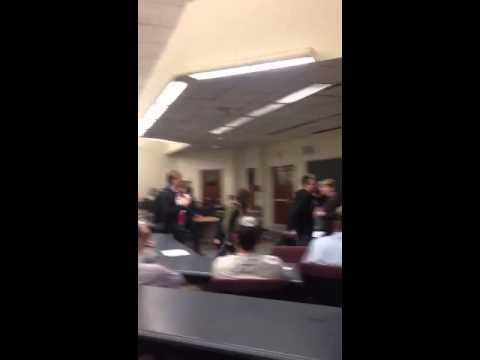It’s possible to keep the following two statements in our heads at the same time about Israel’s decision to deny entry to 22-year-old American BDS activist Lara Alqasem, who was to participate in the Hebrew University program:
- Despite her past involvement in the extremist group SJP (Students for Justice in Palestine), Alqasaem doesn’t currently pose anything resembling a real threat to Israel, and authorities were wrong – both from a policy and public relations standpoint – to detain her.
- If Lara Alqasaem had been in a leadership position with a right-wing extremist group, instead of a pro-Palestinian extremist group, the media wouldn’t have batted an eye, and Alqasaem wouldn’t represent a political cause among ‘human rights’ activists.
Before proceeding with the second statement, what we believe the most compelling and unobserved element of the story, it should be noted that critics of the detention of Alqasem make a valid point when they argue that Israel’s policy of barring BDS activists from entering the country has been heavy-handed at times, and should focus narrowly on real BDS leaders, or others who work to harm the country or promote violence. Lara Alqasem, who is 22 and no longer appears to be actively involved in BDS, as she was when leading her SJP chapter at the University of Florida, does not fall into that category.
However, those who have defended the policy also seem to stand on solid ground when they argue that Israel, by barring Alqasem because of her (radical) ideology, is not acting in a manner substantively different from other democratic countries. CAMERA senior researcher Shlomi Ben Meir recently detailed, in this Twitter thread, numerous examples of democracies similarly barring individuals for ideological reasons, often due to their far-right views. And, this brings us to a central element of the story: the failure of journalists covering the row to report on SJP’s extremism – instead merely noting that they support BDS. However, SJP is, by any definition, a hate group, and not just a group which advocates for the Palestinians.
Here are some examples of SJP’s hate and extremism:
- SJP was founded in 2001 by Hatem Bazian, an extremist who’s engaged in antisemitic rhetoric, has endorsed an intifada in Palestine and in the US, and expressed support for jihadist attacks on American soldiers in Iraq.
- SJP is funded by two organizations dedicated to the destruction of Israel – American Muslims for Palestine and Al-Awda.
- SJP has staged events in which Israel was accused of genocide and even compared to Nazi Germany.
- SJP chapters have hosted antisemitic speakers.
- SJP events have included Hamas and Islamic Jihad supporters, and other speakers who endorse violence.
- SJP members have bullied, intimidated and physically assaulted Jewish students on campus.
- SJP has often disrupted pro-Israel events – including Holocaust Remembrance Day events.
- SJP tactics include the mock eviction notices against Jewish students (not Israeli students, but Jewish American students) posted on their dormitory doors.
- Protests by SJP chapters have included hate-speech and pro-terror chants such as “when people are occupied, resistance is justified” and “From the River to the Sea Palestine will be Free” – calling for the destruction of the Jewish State.
- SJP members have been condemned for using social media site to post antisemitic graphics, including a Nazi propaganda poster, captioned “Liberators”, seen here.
Now ask yourself this: If, instead of leading SJP, Lara Alqasem had led an alt-right or far-right student group founded by an extremist, included chapters which sponsored speakers justifying violence, and was composed of members who engaged in antisemitism and intimidated Jewish students, would the media and ‘activists’ have expressed the slightest concern over Israel’s refusal to let her in the country? Of course they wouldn’t have.
The reason for the double-standard?
Much of it is influenced by the halo-effect, whereby anti-Israel groups – even those with a decidedly regressive political orientation – enjoy a kind of immunity against charges of racism and extremism by virtue of it being assumed that pro-Palestinian activism is inspired by progressive impulses. However, this assumption is undermined both by research and recent events in the UK involving the Labour Party antisemitism crisis, where much of the open hostility towards Jews by party members has been expressed under the guise of mere anti-Zionist activism.
In the eyes of most foreign journalists and progressive activists, those affiliated with far-right, pro-violence groups are unsympathetic and, by definition, racists and extremists – accurate epithets they are far less likely to attach to those, like Lara Alqasem, affiliated with pro-Palestinian groups which express extreme, racist views and advocate for violence.
The fact is that if Alqasem had led a group aligned with the former and not the latter, and had been denied entry into Israel, she’d most likely merely be an Internal Affairs Ministry statistic, certainly not a cause célèbre.





